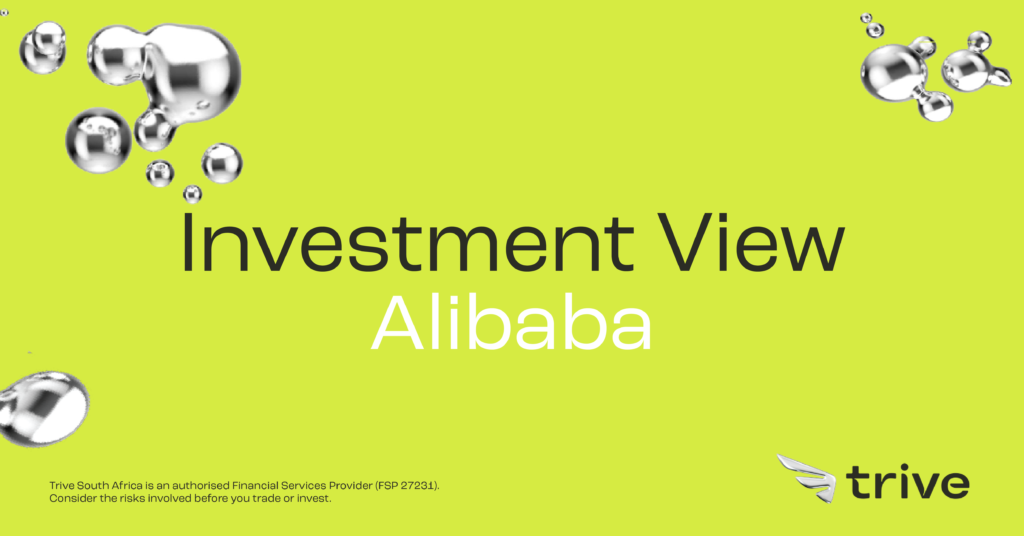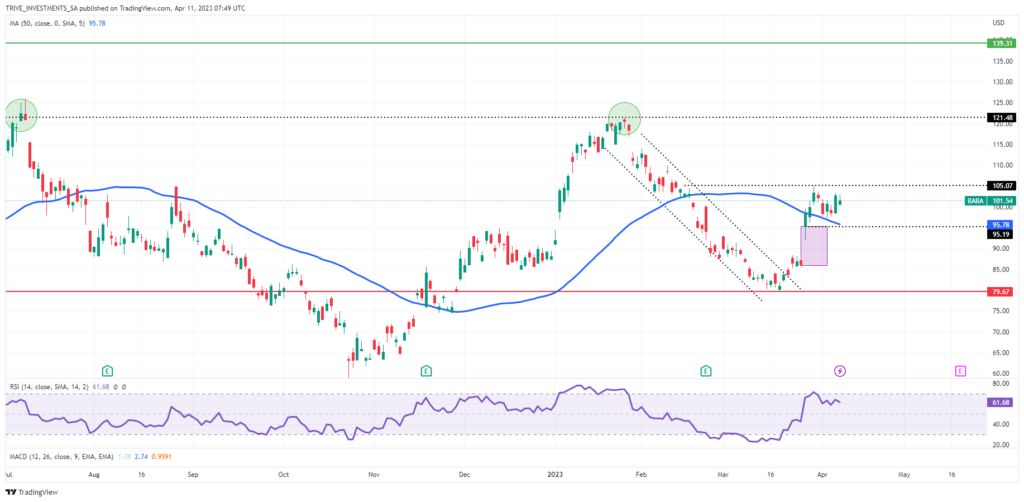
Breakups are not usually good things in life, but this was not the case for the Chinese tech giant Alibaba, which latest split united investor’s opinions.
China’s technology conglomerate Alibaba (NYSE: BABA) surged over 20% in three trading days as investors united their opinion over the company’s announced split into six separate entities. While the move was met with enthusiasm from the market, investors will keep one eye on the remaining risks in the company’s operating environment to determine whether the proposed split is the answer to the company’s recent woes.
From the company’s October 2020 highs, Alibaba has lost almost 65% of its value, as Chinese demand contracted heavily from the tight restrictions implemented during the Covid-19 lockdowns. The government has also scrutinised big technology companies in China, with regulatory constraints posing a significant headwind to the core growth of Alibaba’s business. These changes in the global environment have prompted the restructuring changes as management looks to improve flexibility and efficiency across its business segments.
Technicals
Technical indicators signalled excessive bullish momentum on the Daily timeframe as the price gapped (purple squire) higher from the split news. While the price action is still trading above the 50-day simple moving average (blue line), the $105.42 resistance and $95.19 support levels come into focus.
If the market corrects, we could expect the support level at $95.00 to be tested, and if the price breaks down further, we could see the price gap closed and the major support at $79.62 tested.
However, if support does hold, the share price could converge toward its estimated fair value of $139,92, which was derived on a discounted cash flow basis. Resistance could be met at $105,42 and $121,54, a psychological resistance level requiring further fundamental backing to force a breakout. A long-term opportunity could open up a potential 37% upside from current levels if the company can execute its latest restructuring plan.

Fundamental
The core driver behind Alibaba’s share price flounder in recent years has revolved around the stunting growth of their Chinese e-commerce business. This market may have reached a maturing phase, limiting further growth momentum over the longer term. Although the revenue from this segment has expanded by 18% in fiscal 2022, the first nine months of their latest financial year have only seen a 1% year-on-year growth. This segment accounts for 69% of the company’s top line, with its profitability subsidising the expansion of other segments, such as its digital media and entertainment segment. Furthermore, antitrust regulators in China have squeezed Alibaba’s business and growth capacity by implementing fines and restrictions on their deals with merchants. Due to these risks, the announced split was well received, as it was seen as an opportunity to alleviate the principal risks facing the technology giant.
The restructuring plan would be the biggest in the company’s 24-year history. The company will spin off into six business groups: Cainiao Network Technology Logistics, Cloud Intelligence, Local Services, Global Digital Business, Digital Media & Entertainment and Taobao Tmall Commerce. All of the above groups will be allowed to raise external capital and pursue individual initial public offerings (IPOs), except for the Taobao Tmall Commerce business unit, their Chinese e-Commerce segment that will remain wholly owned by Alibaba. As these companies will all be run by their CEO and board of directors, the decision will provide these management teams with more strategic autonomy in executing specific plans to unlock value in their respective segments. The CEO of Alibaba, Daniel Zhang, explained how the company’s relationship with its units would change to be more of an asset and capital operator rather than a business operator. So, what does this mean for investors?
The split will allow each entity to scale its businesses and attract external investors to raise cash through initial public offerings. This will enable management to enhance their decision-making processes to react and respond faster to market changes in their respective areas while promoting innovation through an agile business model. The individual investor will be able to gain more extensive insight into the individual performance of the respective sectors. At the same time, the overall business could experience relief from Chinese regulators, with the separate entities more closely meeting the compliance requirements of these antitrust regulators. However, that does not mean that the company-specific risks have disappeared.
The demand for IPOs has been considerably low in the current uncertain macroeconomic environment. Alibaba may need a catalyst from extensive external investments to grow its cash flow and expand its now smaller entities to compete with some industry giants. Geopolitical tensions between the US and China pose a further risk to the company and the regulatory and macroeconomic risks involved. However, these headwinds are also alleviated by further innovative expansion within the company. Alibaba recently announced the rollout of its own ChatGPT-style AI chatbot called Tongyi Qianwent across its products in its cloud segment. Even though they did not provide a timeline in the announcement, it shows the company’s determination to stay ahead of the game in technological advancements to compete with major players like Baidu, who have embarked on a similar technological path.
Summary
The market well received Alibaba’s announcement to split into separate entities. The decision has triggered a potential catalyst to unlock incremental value into specific unprofitable segments of their business while pushing to be more compliant with the Chinese antitrust regulators’ demands. If the company manages to navigate the uncertainty with a successful campaign of generating external cash flows into their separate entities, they could unlock a potential 37% upside from current price levels toward $139,92.
Sources: Koyfin, Tradingview, Investor’s Business Daily, Yahoo Finance, Alibaba Group Holding Limited
Disclaimer: Trive South Africa (Pty) Ltd, Registration number 2005/011130/07, and an Authorised Financial Services Provider in terms of the Financial Advisory and Intermediary Services Act 2002 (FSP No. 27231). Any analysis/data/opinion contained herein are for informational purposes only and should not be considered advice or a recommendation to invest in any security. The content herein was created using proprietary strategies based on parameters that may include price, time, economic events, liquidity, risk, and macro and cyclical analysis. Securities involve a degree of risk and are volatile instruments. Market and economic conditions are subject to sudden change, which may have a material impact on the outcome of financial instruments and may not be suitable for all investors. When trading or investing in securities or alternative products, the value of the product can increase or decrease meaning your investment can increase or decrease in value. Past performance is not an indication of future performance. Trive South Africa (Pty) Ltd, and its employees assume no liability for any loss or damage (direct, indirect, consequential, or inconsequential) that may be suffered from using or relying on the information contained herein. Please consider the risks involved before you trade or invest.




